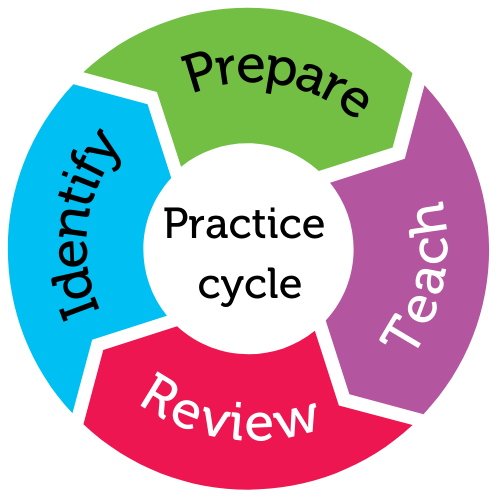
For student year
Helps students to
- discover training pathways
- explore work experience
Helps teachers to
- use myWAY Employability
Summary
Transitioning from school to the workplace or further study is not always easy. Many students are unsure what they want to do and how to go about discovering this information.
The resources in myWAY Employability supports students to explore post-school options, including further study, getting a job, and working for themselves. These resources are available via the resources tab on myWAY Employability and can be used to complement the existing school program.
Australian Professional Standards for Teachers related to this practice
1.1 - Physical, social and intellectual development and characteristics of students
1.6 - Strategies to support full participation of students with disability
4.1 - support student participation
For further information, see Australian Professional Standards for Teachers AITSL page
Preparing to teach
myWAY Employability resources
The myWAY Employability Resources section contains a variety of useful information and links, and practical material. Students can refine their search using the following categories:
- Extracurricular training
- On the job
- Study after school
- Preparing for work
- Life skills
Or browse the full range of articles.
Category overview
Extracurricular training
The Extracurricular training category contains articles to help students think about work and post-school pathways. Articles cover topics like:
Discussion starters
- How can volunteering help build skills to prepare you for the workplace?
On the job
The On-the-job category contains articles to help students understand and prepare for the workplace. These include topics like:
Discussion starters
- What do we mean by soft skills?
- How can we build our soft skills?
- Why is feedback important at work?
Study after school
For students who are interested in post-school study, the Study after school category contains some useful articles:
- Studying at university and TAFE
- Pathways for formal study and training after school
- Open universities and online courses
- Transitioning from school to further study or training
- Student services – this article discusses some of the support services available to students through universities and TAFE
Other resources include:
The Australian Government Beyond School Study Guide also contains some useful information.
Preparing for work
This section contains useful resources to support students finding work, creating a job application, and preparing for interviews.
Suggested approach:
- Refer students back to their strengths and interest’ profile.
- Have students read the myWAY Employability article Harnessing your interests . This article provides some guidance on how to turn interests or strengths into a possible future career.
- Refer to the Career Bullseyes to assist students.
- Read the types of employment article and discuss different types of work.
Other useful articles include:
- Preparing for work experience and internships
- Undertaking work experience and internships
- Developing a resume
- Creating a job application
- Addressing the key selection criteria
Discussions starters
- Why do businesses use selection criteria?
Life skills
The life skills category contains articles to support students around every day skills like:
Possible discussion starters include:
- What other life skills could assist post-school?
- What life skills do you have that might help you with work or study?
Curriculum alignment
This practice aligns with the following standards and capabilities:
Work Studies Curriculum Standards
- ACWSCL006: Investigate a wide range of occupations, and the skills and personal qualities required in these fields.
- ACWSCL014: Source career information and resources.
- ACWSCL017: Investigate formal and informal recruitment processes.
- ACWSCL037: Use a range of tools, methods and skills for accessing work relevant to 21st century recruitment and selection processes.
General Capabilities (Personal & Social Capability)
- Self-management: work independently and show initiative.
- Social management: communicate effectively, work collaboratively, make decisions, develop leadership skills.
In the classroom
Creating a job application
Draft a letter to a company, workplace, or person to request an opportunity to undertake work experience with them. This could be written as a letter of consideration or job application. Students should consider the following:
• How does taking on a work experience student benefit the employer?
• What specific skills can the student offer?
• Why does the student want to undertake work experience at this particular place? Be specific.
Use the myWAY Employability Resource : Creating a job application
If students are unsure where to start for work experience opportunities, the article Undertaking work experience and internships has several useful links.
Practice toolkit
Practice implementation planner template
We know it's not always easy to keep track of what's working and what isn't. So, we've created this template for you to record and reflect on what you're doing to create more inclusive classrooms. The implementation planner contains:
- guidance around goal setting
- a reflection section (what worked, didn’t work, what to change, and next steps)
- prompting questions.
Implementation planner with examples
Set your professional learning goal for:
Work discovery
Benefits of goal setting
Setting, working towards, and reflecting on goals helps you grow professionally and improve your practice. You can access AITSL learning resources for teachers to learn more about:How to set goals
The Australian Institute for Teaching and School Leadership recommends using the SMART matrix to frame your goal setting.SMART goals refers to goals that are:
- Specific
- Measurable
- Achievable
- Relevant
- Time-phased
Resources
Related Practices

Self-discovery
TEACHING PRACTICE
For student years
Helps students to
- identify work-related strengths
- discover career interests
- identify workplace preferences
This practice is from the core research project
Learning Cycle

